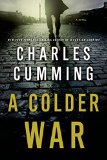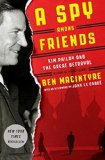Summary | Excerpt | Reviews | Beyond the book | Read-Alikes | Genres & Themes | Author Bio

The most closely-guarded secret of the Cold War is about to be exposed – the identity of a SIXTH member of the infamous Cambridge spy ring. And people are killing for it…
London, 1992. Late one night, Edward Crane, 76, is declared dead at a London hospital. An obituary describes him only as a 'resourceful career diplomat'. But Crane was much more than that - and the circumstances surrounding his death are far from what they seem.
Fifteen years later, academic Sam Gaddis needs money. When a journalist friend asks for his help researching a possible sixth member of the notorious Trinity spy ring, Gaddis knows that she's onto a story that could turn his fortunes around. But within hours the journalist is dead, apparently from a heart attack.
Taking over her investigation, Gaddis trails a man who claims to know the truth about Edward Crane. Europe still echoes with decades of deadly disinformation on both sides of the Iron Curtain. And as Gaddis follows a series of leads across the continent, he approaches a shocking revelation - one which will rock the foundations of politics from London to Moscow…
Non-British readers are probably less familiar with the main subject of Charles Cumming's spy thriller than those in his home country. Cumming, a notable author of five spy novels to date, grounds his narrative in the legacy of the Cambridge Five, a 1950s spy ring. The Trinity Six fuses the traditional conventions of the spy novel with a twenty-first century setting, coupling a quick read with an interesting part of British and Russian history. The result proves that the spy novel, a genre that some might think to be stuck in the Cold War era, is far from dead...continued
Full Review
 (557 words)
(557 words)
(Reviewed by Elizabeth Whitmore Funk).
 The Cambridge Five consisted of Kim Philby, Donald Maclean, Guy Burgess, Anthony Blunt, and John Cairncross, all Cambridge graduates, who made their careers in various British government agencies including the Secret Intelligence Service.
The Cambridge Five consisted of Kim Philby, Donald Maclean, Guy Burgess, Anthony Blunt, and John Cairncross, all Cambridge graduates, who made their careers in various British government agencies including the Secret Intelligence Service.
 They were recruited to work for Stalin's NKVD (the precursor to the KGB) while students at Cambridge in the 1930s by Arnold Deutsch, a Russian talent spotter. Many British students at that time saw the rise of Fascism as dangerous and felt that only the Soviet Union was powerful enough to stand up to the threat.
They were recruited to work for Stalin's NKVD (the precursor to the KGB) while students at Cambridge in the 1930s by Arnold Deutsch, a Russian talent spotter. Many British students at that time saw the rise of Fascism as dangerous and felt that only the Soviet Union was powerful enough to stand up to the threat.
 This belief made it relatively easy for the USSR's secret service to recruit select high-flying students from prestigious universities in the hope that they would rise to positions of ...
This belief made it relatively easy for the USSR's secret service to recruit select high-flying students from prestigious universities in the hope that they would rise to positions of ...

If you liked The Trinity Six, try these:

by Charles Cumming
Published 2015
Cumming returns with MI6 agent Tom Kell (A Foreign Country), in a tour de force that will dazzle readers and critics alike.

by Ben Macintyre
Published 2015
Master storyteller Ben Macintyre's most ambitious work to date brings to life the twentieth century's greatest spy story.